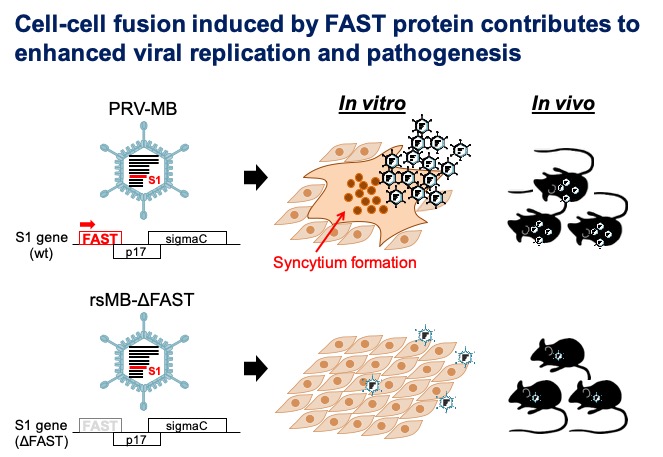Cell–cell fusion induced by reovirus FAST proteins enhances replication and pathogenicity of non-enveloped dsRNA viruses (Kobayahi-Lab, in Plos Pathogens)
Fusogenic reoviruses encode fusion-associated small transmembrane (FAST) protein, which induces cell–cell fusion. FAST protein is the only known fusogenic protein in non-enveloped viruses, and its role in virus replication is not yet known. We generated replication-competent, FAST protein-deficient Pteropine orthoreovirus and demonstrated that FAST protein was not essential for viral replication, but enhanced viral replication in the early phase of infection. Addition of recombinant FAST protein enhanced replication of FAST-deficient virus and other non-fusogenic viruses in a fusion-dependent and FAST-species-independent manner. In a mouse model, replication and pathogenicity of FAST-deficient virus were severely impaired relative to wild-type virus, indicating that FAST protein is a major determinant of the high pathogenicity of fusogenic reovirus. FAST-deficient virus also conferred effective protection against challenge with lethal homologous virus strains in mice. Our results demonstrate a novel role of a viral fusogenic protein and the existence of a cell–cell fusion-dependent replication system in non-enveloped viruses.
This article was published online in PLOS Pathogens in April 25, 2019.
Cell–cell fusion induced by reovirus FAST proteins enhances replication and pathogenicity of non-enveloped dsRNA viruses
Yuta Kanai, Takahiro Kawagishi, Yusuke Sakai, Ryotaro Nouda, Masayuki Shimojima, Masayuki Saijo, Yoshiharu Matsuura and Takeshi Kobayashi*(*Correspondng Author)
Links
- Home
- Achievement
- Research Activities
- Cell–cell fusion induced by reovirus FAST proteins enhances replication and pathogenicity of non-enveloped dsRNA viruses (Kobayahi-Lab, in Plos Pathogens)








